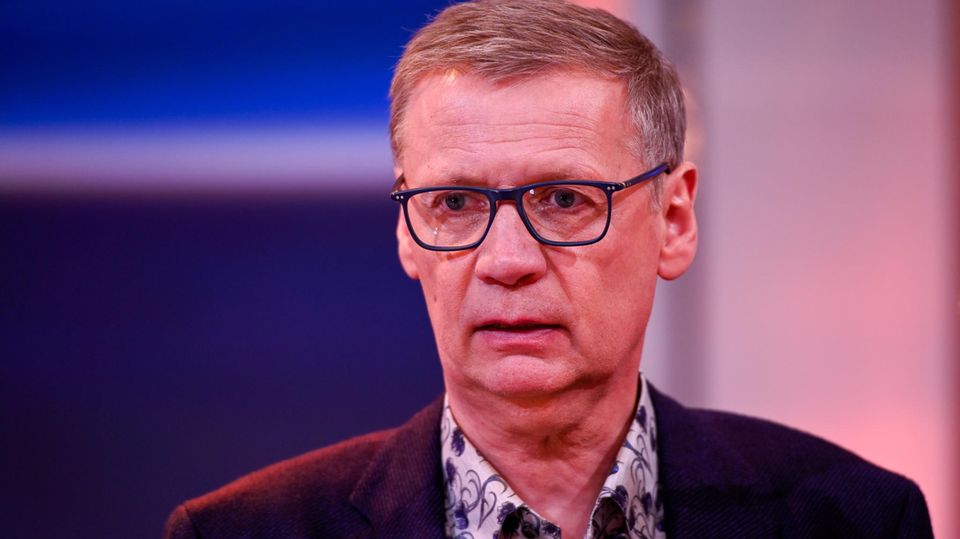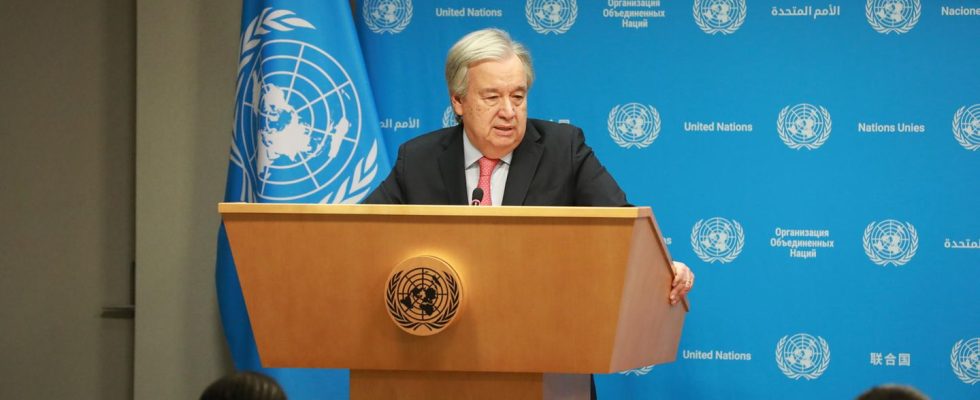War in the Middle East
UN resolution causes criticism – Israel wants to continue war against Hamas
UN Secretary-General Antonio Guterres is skeptical about the planned resolution
© Xie E/XinHua / DPA
13 out of 15 members of the UN Security Council voted for the UN resolution and called for more humanitarian aid in Gaza. The decision is also causing skepticism – including from UN Secretary General Antonio Guterres.
The compromise in the UN Security Council for a decisive expansion of humanitarian aid for around two million people in need in the Gaza Strip met with a mixed response. In addition to a relief that the most powerful While the UN body was not completely blocked in view of the endless suffering of the Palestinian population, there was also widespread skepticism about the quality of the decision.
UN Secretary-General António Guterres said “much more is needed immediately” to help the people of the Gaza Strip. After the vote, a number of countries in the Council also expressed disappointment at the watered-down text, which they nevertheless considered necessary to adopt. The paper calls, among other things, on Israel to “immediately allow safe and unhindered humanitarian access” to the Gaza Strip.
Critics of the resolution are particularly bothered by the fact that a demand for a cessation of violence was removed from the paper due to pressure from the USA. “A humanitarian ceasefire is the only way to meet the urgent needs of the people of Gaza and end their ongoing nightmares,” Guterres said. The 74-year-old Portuguese left no doubt that, in his view, Israel is blocking parts of the Gaza aid.
USA and Russia abstain from UN resolution
The resolution’s negotiator, Emirati Ambassador Lana Nusseibeh, called the text “not perfect” and also stressed the need for a ceasefire. China also expressed disappointment. It also remains unclear how much influence the resolution will actually have. Despite their binding nature under international law, the consequences for Israel if they violate them are likely to be manageable.
The 15 members of the Security Council had fought over the resolution for days and repeatedly postponed a vote in order to prevent the threat of a US veto. In the meantime, Washington had already decided on a rejection in order to protect the interests of its ally Israel. However, massive concessions from the negotiators prevented the decision from failing at the last second. In total, 13 of the 15 countries ultimately voted for the text; in addition to the USA, Russia also abstained. British Foreign Secretary David Cameron spoke of a “difficult process”.
Israel controls humanitarian aid in Gaza
In addition to deleting a passage condemning unscrupulous attacks on civilians, the Council accommodated the United States on the controversial issue of control of aid supplies. The resolution calls for a UN coordinator to be appointed and tasked with checking goods entering the Gaza Strip through all available border crossings. According to sources, the United Nations wants to fill this position this year.
An earlier version of the resolution said the United Nations should have the exclusive right to inspect the shipments. This wording is missing from the adopted text. Israel does not want to give up control for fear of smuggled weapons.
“Israel will continue to inspect all humanitarian aid to Gaza for security reasons,” Foreign Minister Eli Cohen wrote on Friday evening on the X platform, formerly Twitter. He stressed that his country would continue the war “until all hostages are released and Hamas is eliminated in the Gaza Strip.”
USA stands behind Israel
As a result of Israel’s warfare over the past ten weeks, the humanitarian situation for the more than two million people in the Gaza Strip is dramatic. A recent UN study concludes that 577,000 people in the sealed-off coastal strip fall into the most severe category of hunger. In contrast, there are currently 129,000 people in the rest of the world who are at similar risk. Almost everyone in the Gaza Strip is suffering from hunger or displacement. Israel sealed off and attacked the Gaza Strip after the horrific terrorist attack by the Islamist Hamas on October 7th.

The US government also struggled internally during the negotiations. According to Security Council circles, leading diplomats were prepared to abstain much earlier, which would have cleared the way for a resolution. However, US President Joe Biden decided on a veto. Only direct negotiations between US Secretary of State Antony Blinken with Arab counterparts and further concessions changed Biden’s position.
In recent weeks, two similar draft resolutions failed due to US resistance. Washington has always stood behind Israel and said that advances through a resolution could jeopardize ongoing diplomatic efforts on the ground. So far, the UN Security Council only passed a resolution on the conflict that is binding under international law with a humanitarian focus a few weeks ago. The UN General Assembly, on the other hand, has already called for an end to the violence twice through resolutions. However, the resolutions of this body are not binding, but rather are considered symbolic.
What will be important on Saturday
The Israeli armed forces want to continue their ground offensive in the Hamas stronghold of Khan Yun and consolidate their control over the north of the Gaza Strip. At the same time, soldiers are preparing to expand operations to other areas of the Gaza Strip, with a focus on the southern region, military spokesman Daniel Hagari said.

